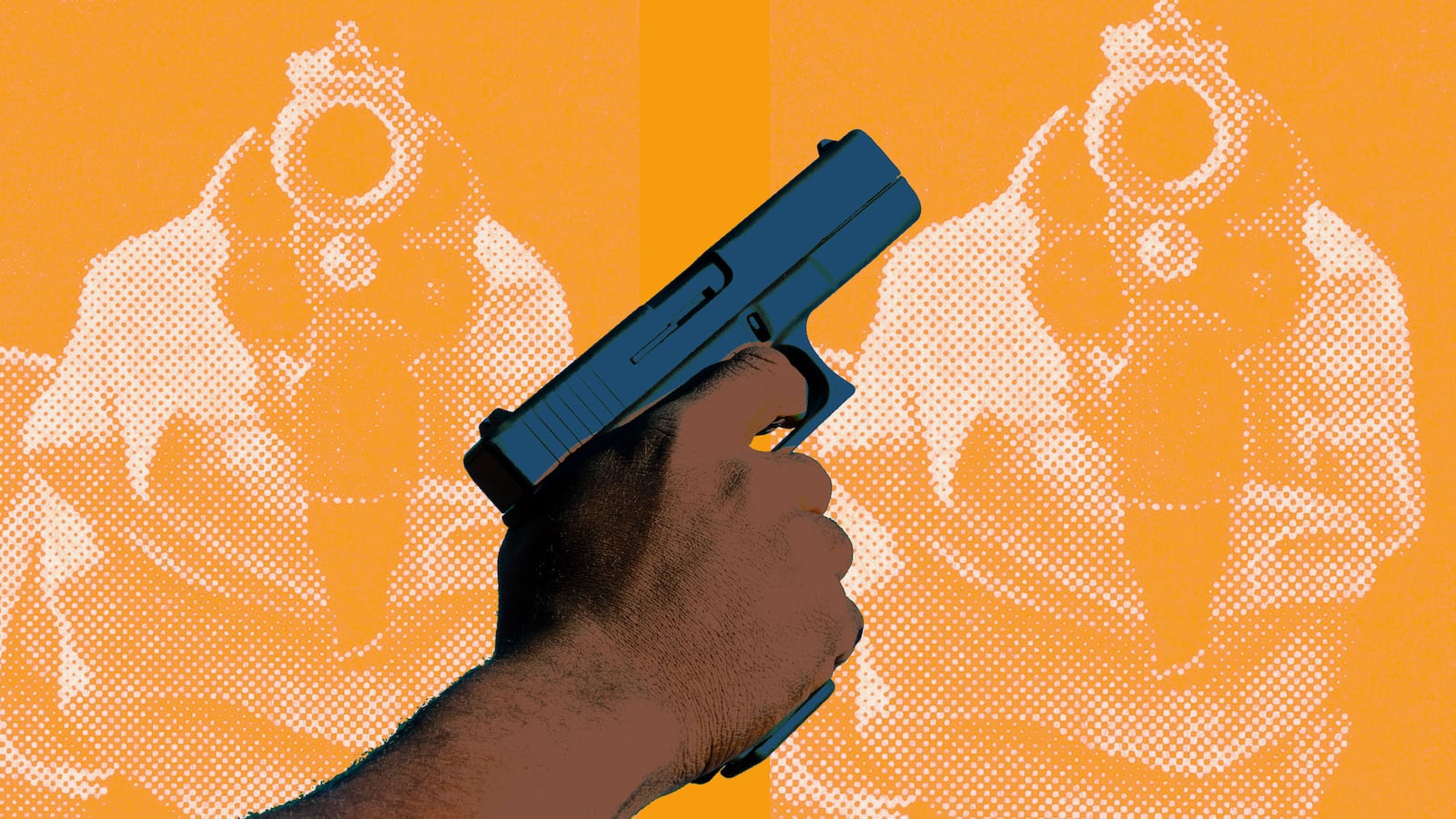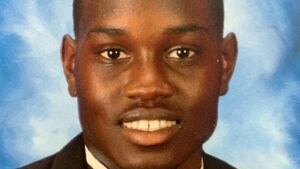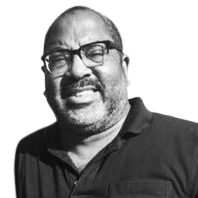Iesha Williams wants her son, Cayden, to learn how to shoot and safely handle a gun when he turns 10.
The 29-year-old single mom from Minneapolis shares a love of basketball with her 8-year-old, who, in turn, tries to teach her how to play Fortnite at home. But with the specter of George Floyd’s killing by local police hanging over them—like so many families of color in America—she can’t help but look ahead to a more primordial kind of training.
“I’m a single mom with a son, and I’m also small, so I want to make sure I’m protecting my son, and we’re also saving ourselves,” she told The Daily Beast.
Williams has never shot a gun, but she’s been thinking about learning how to use one for years. She just discovered the opportunity to apply for a permit—and receive lessons—a few days ago, when a friend introduced her to the Twin Cities Chapter of the National African American Gun Association (NAAGA). Williams, who joined through a special initiative of the chapter to pay the enrollment fees for single mothers, is part of the quiet explosion in the number of black gun owners nationwide. In 2014, 19 percent of black households had a gun owner, according to a study by the Pew Research Center. By 2017 (the latest data available) that number had grown to 24 percent. And NAGA estimates the percentage may now be even higher, considering the organization’s membership numbers this year: NAAGA, which started with one chapter in Atlanta in 2015, now has more than 100 chapters nationwide with 40,000 members. More than 10,000 of them, like Williams, joined this year, according to the group.
The growth parallels a 55 percent increase in the number of white nationalist groups since 2017, according to the Southern Poverty Law Center. The group also reported, citing FBI data, that “27 percent of all hate crimes in 2018—the largest share among all categories—were motivated by anti-black bias.”
African-American gun usage as a form of protection against racial violence is not new and, in fact, is as old as slave rebellions. But the latest deluge of evidence of killings of people of color—by police, by those connected to police, by random white people—have lent the cause even greater urgency.
“It’s not like racism didn’t exist before, but the Trump presidency gave license to allow it to become overt,” said Rik Stevenson, who helped start a NAAGA chapter in Grand Rapids, Michigan, before moving to Gainesville, Florida, to teach at the University of Florida last September. “And black people are seeing that they are targets.”
When Philip T. Smith, 61, founded NAAGA in 2015, he did not envision an organization that would grow so rapidly on the fears of white supremacist violence. Barack Obama was president, and Smith merely started shooting recreationally after a group of friends invited him to a range. Eventually, he invited a group of black friends to join him, and they formed the Bass Reeves Gun Club, which became the Atlanta chapter of NAAGA.
“Today, we’re getting so many different types of folks,” Smith told The Daily Beast. “Doctors, engineers, unemployed state workers, federal workers, policemen, military. We even have white, Latino, and Asian members. You can be gay, straight, loud, quiet, dorky, rich, or poor.”
In the shadows of news coverage of protests nationwide, people like Williams live with the sometimes painful challenges of raising African-American children in a hostile climate. Many parents like her see learning how to use guns safely as one of the best options to protect their families. Williams, who voted for Hillary Clinton in 2016, says she is troubled watching what looks like a rise in open white supremacy and Americans erupting in anger over politics. She says she tries her best not to discuss Trump, politics, “and watches her back everywhere” to avoid giving anyone a reason to bother her or Cayden.

Iesha Williams
Photo courtesy Iesha WilliamsBut to preserve some semblance of childhood innocence, she wants to learn to shoot first herself and not expose him to guns for at least two years. She has also shielded him from the news coverage of the death of George Floyd and subsequent protests because the coronavirus had already created enormous stress in his life. Since the pandemic, Cayden has begged Mom not to go to her job as a registration agent in the emergency room of a local hospital. Since she works third shift, she drops her son off to stay over with her sister on work nights; they never grappled with any separation issues until now, she said.
“He says he’s scared I am going to catch the virus at the hospital and bring it home,” she told The Daily Beast.
She also tried to avoid watching the video of her city’s police officers presiding over the death of George Floyd. When she finally saw it on Facebook, she imagined the world that Cayden will face as an African-American male when he is no longer the inquisitive boy whose favorite pastimes are devouring cheeseburger sliders and absorbing books about sharks and insects. She considered going to one of the George Floyd protests, but only for a few minutes—until a troubling question conquered her thoughts.
“What would happen to Cayden if something happened to me there and I didn’t make it home?”
Stevenson, for his part, never expected to discover a new love at age 65, especially one that didn’t require him to give up his wife, he joked. “I was in the gun store and I saw this Glock,” Stevenson said. “It was actually a Glock 23. I tried it out and I loved the way it felt... The handle is polymer. It’s a very light plastic but it’s durable. And the versatility. You can use the same frame but swap out different slides. The gun felt so good, it was a natural fit for me.”
Stevenson’s journey to becoming a gun enthusiast three years ago was not born out of any kind of romantic feeling. “I was driving to Lansing, Michigan, which is about 58 minutes from Grand Rapids, so I had to get off the freeway in a place called Grand River. It was right after the 2016 election.”
Just after Stevenson pulled into the gas station at around 10 p.m., he saw something that startled him. “Four guys in a quote ‘redneck truck’ with the big tires… and a big Confederate flag … And you know that thing they call the ‘n---er stare’…”
It was a look that he received from three guys who would not take their eyes off of him as he pumped the gas. “For the first time in my life, I felt this eerie feeling that if they wanted to attack me or whatever, there was nothing I could do about it. I wasn’t armed. I was the only black person there and… it probably wouldn’t have worked out for my behalf.”
After pumping the gas, he rushed back in the car and drove away with a pounding heart. “I called my wife and I said, “Babe, when I get home, tomorrow I want to go and start looking at some firearms.”
For Stevenson, guns became a new passion. He learned to shoot with his right and left hands and was at the range in his spare time. In two years, he was a licensed gun instructor.
“Everything I’ve ever loved and learned to do when I was a kid, I learned it so I could teach it,” he said. “I teach swimming. I teach tennis. I teach African-American studies. My dissertation was a study on suicide by diving as a form of resistance on the Middle Passage. So I’m also a scuba diver instructor.”

Mel Atkins
Photo courtesy Mel AtkinsAs Stevenson became immersed in the gun community, he met other African-American gun lovers in Grand Rapids who helped form the NAAGA chapter, which has trained black pastors in firearms and held lessons for members of black churches.
For Mel Atkins, a private firearms instructor and deputy for the Kent County Sheriff’s Department, discovering and expanding the community of black gun owners in the area was transformative. Atkins, who owns more than 30 guns, had witnessed the world of guns in Michigan as the lone black guy.
“It was an amazing experience in racism for me,'' Atkins said, remembering when he joined his first gun club. “You see a new guy walk up, and the leaders talk to him politely... When the black kid pulls up, opens the trunk, and pops out a bag full of guns, there’s a different response.”
That kid was Atkins in his twenties, who developed a passion for firearms as a teenager. “In Michigan, we have what we call open gun ranges, where you can go on state land, the designated range area, and shoot, and it’s kind of like going to.... the movie Deliverance. You pull up, the locals come out of the weeds, and they got all their issues and some are just flat-out racist.
“‘What are you doing here?’ they would ask.”
"’The same thing you’re doing,’ I would answer. And so I’ve had some impolite conversations while we’re both armed.”
Both Atkins and Stevenson say being part of the gun community in Grand Rapids gave them a window into the world of white paramilitary violence. ”Some of the largest militias are white, racist militias,” Stevenson said. “When they put their programs of attack together, the first thing they do is look at black communities, because they sense that we are under-armed.”
It was Frederick Douglass who said a good revolver was the best response to a slave catcher. Yet traditionally, black gun ownership “has been under the radar,” according to Nicholas Johnson, a law professor at Fordham and author of Negroes and the Gun, The Black Tradition of Arms. “The traditional narrative around nonviolence of the civil rights movement has obscured the history of black protection through guns from the slave revolts to the Jim Crow era,” he said. “But laws restricting black gun ownership did not stop blacks from obtaining and using them for protection when possible.”
The shooting deaths of African-Americans at the hands of police demonstrate the limits of black gun ownership to provide safety. Consider the case of Philando Castile, also in the Minneapolis area, in which a gun and legal permit did not stop the African-American man from being gunned down by a police officer at a traffic stop four years ago. In Louisville on March 13, police officers executing a search warrant in a narcotics investigation entered EMT Technician Breonna Taylor’s apartment. The officers, who allegedly failed to identify themselves as police, exchanged fire with Taylor’s boyfriend, Kenneth Walker, who was a licensed gun owner. They ended up killing Taylor, and one officer was also injured. According to lawyers representing Taylor’s mother, the primary suspect police were looking for had already been located.
NAAGA leaders counter that guns can still provide immeasurable psychological benefits in a conflict. When Smith unpacks the tragic death of Ahmaud Arbery, he imagines a very different outcome for the black jogger who was gunned down by white men in a truck in a posh neighborhood in Glynn County, Georgia.

Louis Dennard
Photo courtesy Louis Dennard“If I’m jogging, I still have a firearm on me,” said Smith, who has a license to carry and rarely goes anywhere without a gun. “And if suddenly, some guys come running up to me with a shotgun hanging out of a car telling me to stop and they want to talk to me, I’m not even hesitating to protect myself legally. If someone’s popped out with a gun and you’ve popped out with your gun—may the best man win. That’s a different conversation. I think that could have changed the narrative.”
Smith said the widespread refusal of some black people to embrace their Second Amendment rights potentially gives any kind of racist aggressor with a gun the psychological advantage of the schoolyard bully. “If the two men with racist leanings chasing Arbery know this person doesn’t have a gun, then they can go bully him like they did and take advantage of the situation. So, I do think the firearm may have made a difference. Doesn’t guarantee anything, but gives you a fighting chance.”
Still, many black folks are not boastful gun owners—even in states where they can openly carry.
“Black people still aren’t very social about their firearms,” Atkins told The Daily Beast. “Our state (Michigan) allows me to walk around with a firearm on my hip or strung across my shoulder as long as it’s visible to everybody. Black people never do that. Only damn fools and maybe some Republicans ever do that. And black gun owners are very quiet about it, because historically a black gun owner could get in trouble for it. There’s that stigma attached to it, that I’m going to get hassled by law enforcement for the mere possession of a firearm.”
NAAGA chapters have tried to battle the stigma and raise the visibility of black gun ownership in the wake of protests over the death of George Floyd. In Minneapolis, Louis Dennard, president of the Twin Cities NAAGA chapter, led a team of six armed members to patrol and protect blocks with a church and black-owned businesses after the recent curfew was imposed. A little over a week ago, Stephen Alexander, president of the Lansing NAAGA chapter, gathered with 50 other members from Midwestern chapters. They stood, armed with a diversity of guns outside the Michigan state legislature, just a couple of weeks after a group of armed white men gathered to protest the governor’s Stay at Home orders.
“What happened to George Floyd is symbolic and demonstrative of what happens to us,” Alexander said. “We wanted to send the message that if we can’t look to the police to protect us, we have to understand that our personal safety is our personal responsibility.”
Iesha Williams says learning how to shoot and providing lessons for Cayden are the first steps in assuming that responsibility. However, she admits guns are not the only answer and, perhaps, that self defense is not the ultimate solution. When thinking about the murder of George Floyd, her mind continues to wrestle with questions that have nothing—directly—to do with guns:
“Why didn’t anyone help him?” she asks, adding, “I keep wondering about that. Can’t stop wondering about it.”



